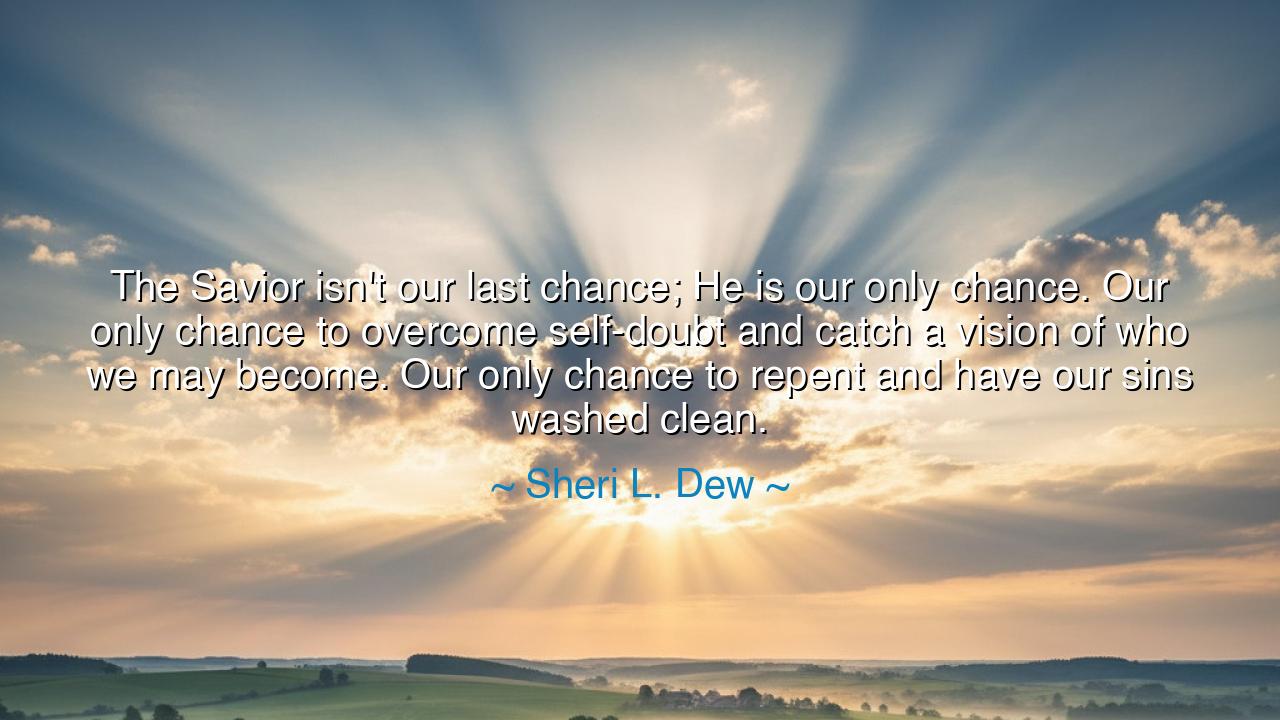
The Savior isn't our last chance; He is our only chance. Our only
The Savior isn't our last chance; He is our only chance. Our only chance to overcome self-doubt and catch a vision of who we may become. Our only chance to repent and have our sins washed clean.






"The Savior isn't our last chance; He is our only chance. Our only chance to overcome self-doubt and catch a vision of who we may become. Our only chance to repent and have our sins washed clean." These profound words from Sheri L. Dew strike at the heart of human struggle, the eternal conflict between imperfection and the desire for redemption. Dew reminds us that the Savior is not a distant figure to be called upon in the last hour, but rather the central force in our lives—our only chance to break free from the chains of self-doubt, to embrace the potential within us, and to find forgiveness for our failings. The Savior, in this sense, is not just a figure of hope in the final moments, but a constant source of strength in every step of our lives.
In ancient thought, redemption and spiritual guidance were key to understanding the purpose of life. The Hebrew prophets of the Old Testament, such as Isaiah and Jeremiah, spoke of the coming of a Messiah—a figure who would redeem the people and restore them to the divine. These ancient teachings emphasized that the path to redemption was not simply about waiting for a moment of salvation, but recognizing the need for divine intervention throughout life. Much like Dew's words, the ancient prophets knew that salvation was not just a matter of final judgment, but a constant need for guidance, forgiveness, and renewal. The Savior’s role was to offer grace, to transform hearts, and to cleanse people not just of their sins, but of their doubts and imperfections.
Similarly, in Greek philosophy, the concept of redemption and self-actualization was a theme that was explored in many ways. Socrates, the great philosopher, often spoke of self-examination and the need to overcome ignorance in order to achieve true wisdom and virtue. He taught that through the pursuit of knowledge and truth, a person could transcend their limitations and reach a higher state of being. Yet, as much as Socrates championed the power of human reason, he too acknowledged that without a guiding force beyond ourselves—without divine inspiration or grace—our efforts would always fall short. In much the same way, Dew’s quote reminds us that self-improvement, though valuable, is incomplete without the guidance of the Savior—the one who offers us the chance to become who we are meant to be.
Consider the life of King David, whose failings as a leader and man are well documented in the Bible. Despite his great triumphs, David fell deeply into sin, committing acts that seemed irredeemable. Yet, in his darkest moments, he turned to God, acknowledging his sins and seeking forgiveness. David’s repentance and return to the path of righteousness serve as a reminder that redemption is never about perfection, but about the willingness to recognize our shortcomings and seek divine grace. Like David, we too have the opportunity to turn to the Savior—not at the end of our lives, but in every moment of weakness, when we find ourselves far from where we should be.
Dew’s words also touch on the power of self-doubt—the internal battle that every person faces. We all struggle with the voice inside that tells us we are not enough, that we are unworthy, or that our mistakes are too great to be forgiven. Self-doubt can trap us, making us believe that we are beyond redemption or that we cannot possibly live up to our potential. But the Savior’s role is to banish these doubts, to help us see beyond our immediate fears and failures. Just as the apostle Peter walked on water toward Christ, only to falter in self-doubt, we too often falter when we lose sight of the Savior. But just as Christ extended his hand to Peter, He extends His hand to us, offering the chance to rise above our doubts and reach for the vision of who we are meant to become.
The lesson in Dew’s words is one of hope and courage. The Savior is not merely a figure to turn to in moments of finality, but the only chance we have to overcome self-doubt, to find true forgiveness, and to pursue the life we are meant to live. The idea that the Savior is not just our last chance, but our only chance, calls us to recognize the centrality of His role in our lives. Self-doubt and guilt can paralyze us, but the Savior offers a path out—a path that leads to healing, strength, and transformation. We need only to turn to Him, with the faith and humility to receive His guidance and grace.
In practical terms, Dew’s reflection encourages us to actively turn to the Savior not just in moments of despair, but as a constant source of support and renewal. Just as David sought forgiveness and transformation in his lowest moments, so too must we recognize that repentance is not a one-time event, but a continuous process of seeking alignment with divine will. To overcome our doubts, we must rely not only on our own strength but on the grace offered to us. Let us seek to strengthen our faith, turn to the Savior in every moment of weakness, and trust that through His grace, we can become more than we thought possible—a reflection of our highest potential.






AAdministratorAdministrator
Welcome, honored guests. Please leave a comment, we will respond soon